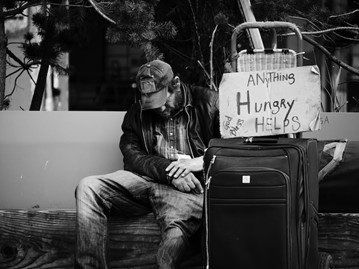Benjamin Hutson is currently pursuing a pre-med program at UW Milwaukee and has a passion for helping others. Benjamin aspires to join the military as an officer, continuing his medical education through the Navy. In the following article, Benjamin Hutson explains the importance of advocating for and assisting homeless veterans, truly exemplifying the spirit of compassion and dedication to service.
On any given day, nearly 40,000 military veterans in the U.S. are experiencing homelessness, and
an estimated 1.5 million veterans are at risk of becoming homeless.
These veterans spend most nights alone, often without shelter, a bed, or any food. Sometimes they are alone, while others are with their families. Homeless veterans also commonly have to cope with other challenges, such as hunger, mental health issues, alcohol and drug abuse, and unemployment.
Programs such as the National Coalition for Homeless Veterans (NCHV) have worked for decades to offer support for homeless veterans, and these efforts have helped decrease the number of veterans experiencing homelessness in the U.S. by
almost 50% since 2010.
Benjamin Hutson says that each year, hundreds of thousands of homeless veterans receive assistance through free health services, housing, food, and job training, but there is still much more work to be done.
Benjamin Hutson Describes the History of Homelessness
Benjamin Hutson explains that a shocking fact of military service is that the risk of homelessness increases when one becomes a veteran — and veterans are overall more likely to experience homelessness than those of the general population. In 2019, 21 out of every 10,000 veterans were homeless.
Thanks to organizations like the NCHV and the U.S. Department of Veterans Affairs (VA), homeless rates among veterans are steadily falling, but serious issues remain. Among veterans, people of color are even more likely to be homeless; 106 out of every 10,000 Pacific Islander and Native Hawaiian veterans are homeless.
Benjamin Hutson says that health emergencies such as COVID-19 have caused setbacks with homeless services for veterans, as have related eviction and unemployment rates.
More encouraging, though, is the fact that right before the pandemic, veteran homelessness was cut in half thanks to the particularly strong programs of
three states and 79 communities singled out by the U.S. Interagency Council on Homelessness.
Community Relief
Benjamin Hutson notes that the VA is the largest federal agency supporting current military servicepeople, veterans, and their families. This group’s community-based programs have played a particularly strong role in the fight to end veteran homelessness.
Their central focus is providing housing that is both reliable and safe. The VA awards per diem support and grants through its Homeless Providers Grant and Per Diem Program to nonprofits and other organizations that host housing centers for homeless veterans.
Benjamin Hutson reports that, in partnership with the U.S. Department of Housing and Urban Development, the VA also provides over 87,000 housing vouchers across the country through its HUD-VA Supportive Housing (VASH) Program. Veterans and their families can live in rental units at market rates through the vouchers while simultaneously benefiting from case management services offered through the VA.
Further assistance and grants are offered through the Supportive Services for Veteran Families (SSVF) Program, which focuses on helping veterans and families stay in their homes.
Another vital program: the VA’s Health Care for Homeless Veterans (HCHV) Program, which has a mission to reduce homeless rates among veterans by directly reaching out to the most vulnerable, offering rehabilitation and treatment programs.
 A Multifaceted Approach
A Multifaceted Approach
Homelessness has many potential causes, and no two cases of a homeless veteran are the same. Over the past decades, specialized organizations have been formed to address these various facets of homelessness in the veteran community.
The Disabled Veterans National Foundation is one such example. The group raises awareness of both the visible and invisible disabilities that impact many veterans, homeless or not, including seizure disorders, traumatic brain injury, and post-traumatic stress disorder (PTSD).
Benjamin Hutson says that according to the DVNF, about 54% of veterans who are homeless have some form of disability, over 50% of homeless vets have a mental disability, and about 75% also have a problem with substance abuse.
The DVNF’s Health & Comfort program sends much-needed goods to homeless veteran organizations across the country, clothing thousands, filling vital hygiene needs, and offering overlooked essentials like toothpaste and deodorant.
The multi-pronged approach to helping homeless veterans also stems from the array of risk factors. Research has shown that the largest risk factors for homelessness within the veteran community are post-discharge social isolation and general lack of support. About 1 in 5 veterans lives by themselves, as they tend to have high divorce rates and low marriage rates.
Benjamin Hutson says that without a strong support system, it is shockingly common for veterans to face homelessness soon after their service to their country ends.
 A Multifaceted Approach
A Multifaceted Approach